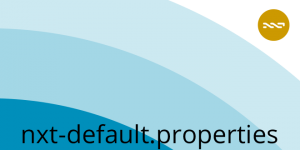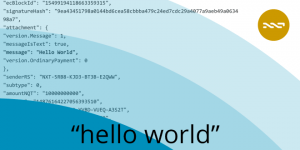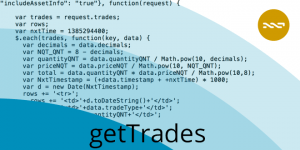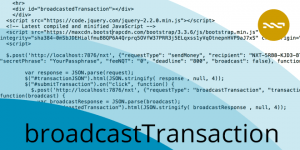/Nxt developers
Core developer Lior Yaffe introduces the Nxt core features and design, it's API and the future, Nxt 2.0, ARDOR.
Getting Started
BCNext, initiator of Nxt, building on Bitcoin creator Satoshi Nakamoto’s ideas, sketched out his vision of a distributed cryptographically secure blockchain platform, comprising not only a digital payment system, but a wide range of built-in services and the capacity for third party developers to add their own applications, all fully secured by the Nxt Proof-of-Stake (PoS) protocol.
Nxt is a Blockchain 2.0 Software.
Blockchains can be useful in various applications, facing global audience and supporting company internal infrastructure. A blockchain is a distributed database, a copy of the blockchain is stored on each node in a peer-to-peer network. This extreme redundancy can be duely considered inefficient, but please stay with me for a couple of minutes of blockchain theory.
As each node validates all transactions recorded into the blockchain and as past transactions cannot be rolled back or tampered with like in traditional RDBMS, this redundancy makes the blockchain *immutable*, and that is a very important value proposition of blockchains. Immutability of data is something traditional databases cannot provide.
Nxt has built a whole ecosystem around secure and transparent data handling. You can start your own services, create currencies, issue assets and trade them, use a built-in marketplace, data cloud and much more!
The Nxt Reference Software (NRS)
The NRS server is a Java application with two interfaces: one for communicating with other servers through the Internet (forming the network of nodes), and one for responding to requests from clients through its extensive API.
The NRS can run on small devices like a laptop computer or even a Raspberry Pi without exhausting it, and Nxt’s unique algorithm does not depend on any implementation of the coin age concept used by other PoS cryptocurrencies – it is resistant to the so-called Nothing at Stake attacks.
Smart Transactions
Nxt and Ardor use ‘smart transactions’ not ‘smart contracts’.
By leveraging these primitive Nxt transaction types, Nxt can be seen as an agile, base-layer protocol upon which developers without much prior knowledge in the cryptocurrency field can create a limitless range of secure decentralised services, applications, and even other currencies.
With smart transactions Nxt transactions do not require any script processing or transaction input/output processing on the part of network nodes; scripts are already embedded, the code which is executed is actual software that runs in the node server.
When a user wants to express their opinion at a poll, purchase an item in the marketplace or sell some stocks, the transaction the user submits contains only the parameters necessary for the transaction, and the ID of the functionality they want to use, keeping the consensus of the majority of the nodes as the absolute proof that the output, saved in the next block, is the genuine result of that transaction.
Another difference is that a computer application has tenfold more power and possibilities, compared to a script interpreted in a virtual machine, as it is the case with the “smart contracts” used in f.x. the Ethereum blockchain.
“Nxt is indeed the most amazing decentralised tool for businesses that knows no borders, no central authorities, no risks of fraud. With its API and hundreds of endpoint calls, Nxt is an easy tool to integrate with other software solutions, thus being the perfect solution for each business need.”
~Roberto Capodieci, DeBuNe
Blockchain As A Service
With the upcoming release of ARDOR (Nxt 2.0), planned for testnet in Q1 2017 and public mainnet in Q3 2017, scalable customisable childchains with their own unique transactional tokens, crosschain transactions, secured by an existing network of nodes, will become available to anyone.
Developers working with the Nxt API can port their new or existing Nxt projects to the new ARDOR ledger, IF they want to do so, after it has been launched.
"We have chosen Nxt for the technology it provides, it’s known stability and it’s technological roadmap. We hope to be part of the Nxt ecosystem for a long time to come.”
~ lobos, the Janus project
Nxt Plugin system
Nxt Plugins are installed locally.
The plug-in system is an example of the philosophy of flexibility and versatility that is at the heart of Nxt. Nxt Plugins enables third-party software developers to add functionality to the Nxt (NRS) client.
Beginners guide
Coding for NXT Crypto Platform #1: Configuration Setting up the config File The configuration file of Nxt is an important tool for you to setup how Nxt works on your computer. With the configuration file, you can setup your Nxt to use SSL, Setup Nxt on a Raspberry Pi or configure your Nxt for development, …
Coding for NXT Crypto Platform #2: First Steps About Nxt Did you ever want to participate in a financial field with your Software without taking big risks and have an easy and anonymous access to? Have you tried to access monetary systems and get transparent data from Asset Exchanges, Marketplaces, Data clouds? Nxt is a …
Coding for NXT Crypto Platform #3: Output from the Asset Exchange The Star of Blockchains Welcome to the third article on coding with NXT. In the previous articles I have shown you how to set up your Nxt configuration file to easily develop with JavaScript and how to get the first output from the Blockchain …
Coding for NXT Crypto Platform #4: Historical Asset Data In the last topic I showed you how to retrieve basic data about Assets from the Nxt Asset Exchange. In this article I want to cover how to receive historical trades. The API call we are using here is “getTrades”.’ Historical Trades Historical trades can either …
Coding for NXT Crypto Platform #5: Transactions on the Nxt Blockchain Nxt Blockchain The Nxt Blockchain is the heart of Nxt. Every Transaction ever made is recorded on the Blockchain. The Blockchain is a decentralized database, which is saved on your computer. To prevent spam, for every transaction you have to pay fees in the …
Resources
Testnet
https://nxtwiki.org/wiki/Testnet
Testnet explorer
https://test.nxtportal.org/monitor
Blockchain explorers (main net)
https://nxtportal.org
https://mynxt.info/blockexplorer
Nxt Blockchain Tutorial
https://nxtwiki.org/wiki/Nxt_Blockchain_Tutorial
Plugin guide
https://nxtwiki.org/wiki/Plugins
NRS plugin forum
https://nxtforum.org/nxt-plugins/
NRS Plugin Generator
https://github.com/chevdor/generator-nrs-plugin
PHP Library
Nxt Proof of Stake algorithm
Jelurida
Nxt API
https://nxtwiki.org/wiki/The_Nxt_API
Nxt Peer Explorer
NxtDevKit
https://github.com/Tosch110/NxtDevKit
NxtLib Library
https://github.com/libertyswede/NxtLib
https://nxtforum.org/api-discussion/nxtlib-a-typed-net-api-wrapper-for-nxt
C# wrapper for the API
https://github.com/libertyswede/NxtLib
Nxt Docker container
https://github.com/chevdor/docker-nxt
https://nxtforum.org/index.php?topic=9567
Dev mailing list
http://nxt.org/cgi-bin/mailman/listinfo/nrs-development
Suggest improvements to Nxt:
Get in touch
https://nxtforum.org/introduce-yourself/
Chat
Invitation link:
https://nxtplatform.org/slack/
Channel: #developers @ ardornxt.slack.com




